With the 10th anniversary of Veganuary in full swing, we take a look at how the vegan bakery market is shaping up in 2024 and the trends affecting it.
Here are seven things you need to know about baked goods this Veganuary:
Flexitarians are driving real growth
The vegan bakery market is on the rise as more and more businesses look to secure a slice of the vegan-friendly pie.
A report by Straits Research in 2023 indicated that the UK vegan market was growing at 9.6%.
“Rapid product innovation focussing on improving vegan bakery taste and texture means that a vegan offering is now a ‘must have’ in the bakery industry,” believes Jacqui Passmore, marketing manager UK and Ireland at Dawn Foods. “This has been driven by demand not just from strict vegans but those wishing to reduce animal derived foods from their diet as a lifestyle choice.”
She points to data from Innova Marketing Insights, which highlights that the number of people committing to a strictly plant-based diet has plateaued while the “real growth is with the flexitarian consumer where numbers have increased significantly”. Innova’s Plant Forward report also notes that more than 60% of global households now eat meat-free meals at least once a week.
Manufacturers are eager to cater to this demographic with a raft of new launches hitting the shelves. Innova data reveals a significant uptick in launches with pastries and sweet goods experiencing 61% year-on-year growth, and cookies & biscuits 43% growth.
“This tangibly translates to more than 170 ‘suitable for vegan’ product launches in the cookies & biscuits category and 68 new vegan cakes and cupcakes over the past three years, according to Innova Product Database,” outlines Philippa Knight, marketing director at Puratos UK.
“The trend is now evolving into seasonal products too. In the UK, 10 new vegan mince pie products were launched in supermarkets in 2023 compared to just two the previous year. These figures highlight the increasing preference for plant-based products that align with personal values, and demonstrate the mass movement toward mindful consumption,” she adds.
![]()
Health and sustainability are key purchase influencers
Speaking of mindful consumption, health and sustainability are high on the agenda for consumers (whether vegan or flexitarian) shopping for plant-based products.
Puratos’ Taste Tomorrow research found that almost half (47%) of UK consumers now buy plant-based food on a weekly basis, which Knight says is “largely driven by a desire to make more climate-conscious and health-focused purchases”.
This is further supported by a global survey from NSF released in 2021 that revealed 88% of food industry practitioners expect demand for plant-based products to increase, with 74% suggesting consumers choose plant-based for a healthier lifestyle and 60% believing it is due to it being more environmentally friendly.
“Vegan products will become key because, in stark terms, it simply isn’t sustainable to carry on eating the levels of animal products we currently do worldwide, for several reasons,” says Michael Schofield, Bakels group marketing manager. These reasons include the health implications of a diet high in red/processed meat and the environmental impact of farming.
“Reducing meat consumption is a vital measure to tackle the climate crisis. With the global food system responsible for about one-third of global greenhouse gas emissions, animal-based foods are accountable for the largest share,” Schofield believes.
They’re particularly important to Gen Z and Millennial audiences, who are also key participants in Veganuary.
“We’ve seen a noticeable behavioural shift in the pastry category, where 17% of consumers are now actively seeking out plant-based alternatives,” comments Stéphanie Brillouet, marketing director at Délifrance. “This is particularly true amongst younger consumers, where 76% of 18- to 24-year-olds often consume plant-based products. There’s a huge opportunity for operators to attract these more health and planet-conscious consumers, but also to encourage others to try something new.”
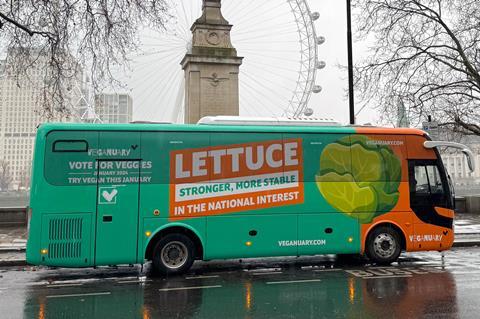
Bakers should shout about vegan options
To lure in these audiences “bakers would do well to emphasise the ‘vegan-suitable’ message on their point-of-sale material and social media”, says Schofield.
This marks a turning point as some previously thought that going too strong on vegan messaging would prove detrimental to sales due to the perceived inferiority of vegan items. It’s even more pertinent during Veganuary, when more shoppers seek goods without animal products in them.
“From a marketing perspective Veganuary is an opportunity for businesses to market plant-based and free-from to an entirely new audience of first-time buyers,” comments Ross Lowrey-Heywood, development innovation manager at Finsbury Food Group, “which means attractive packaging and quality of product is key to engage them and keep them returning to these products throughout the year as converts and advocate.”
It’s a tactic manufacturer Proper Cornish has embraced since introducing vegan lines to its pasty and savoury pastries range. Now, vegan products account for 11% of its sales and vegetarian ones 13%. It’s vegan-friendly line-up includes a Vegetable Pasty, Mexican Style Bean Pasty, a Proper Cornish Vegan Pasty, and Vegan Sausage Roll.
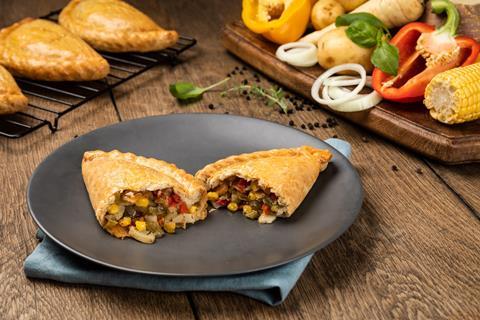
“We have seen significant growth in our vegan product sales, and we are marketing them to not only appeal to vegans but also to the increasing number of flexitarians who are seeking to reduce their meat intake,” explains Proper Cornish MD Paul Saunders.
One vegan option won’t cut it anymore
Bakery is abundant with choice and those seeking vegan-friendly goods expect to have options.
“Customers are no longer satisfied with a single vegan offering,” explains Passmore at Dawn Foods. “They demand the same choice along with the premium fillings and toppings comparative to their non vegan counterparts. A good vegan bakery offering should provide consumers with vegan alternatives that replicate, as close as is possible, the eating experience of non-vegan products.”
Coffee shops and other major players in the out of home bakery market are acutely aware of this. Greggs, for example, has reintroduced its Vegan Steak Bake to widen its range, while Costa has added several plant-based wraps and sandwiches to its line-up this month.

Passmore admits that for the retail baker this can be daunting, particularly if they are just starting out on their vegan journey as they worry about a potentially exhausting list of ingredients and upskilling.
That’s where the ingredients manufacturers come in. Many have been investing in their vegan-friendly ranges with recent launches including a Vegan Sponge Mix from Dawn Foods, a Magic Glaze from CSM Ingredients, and a vegan choux mix from Puratos.
“Ready to use vegan mixes, for example, mean all the hard work in ensuring a completely vegan finished product has been done for you,” Passmore adds. “It’s almost like having a blank canvas to create your own ideas. The broad range of vegan ingredient solutions available now means the boundaries between vegan and non-vegan are becoming increasingly blurred for the better.”

Bakers need to be aware of all budgets
Admittedly, this is true for all areas of the bakery market, but free-from consumers have long bemoaned the perceived mark-up on foods to meet certain dietary requirements.
“Plant-based on a budget is an emerging trend,” says Knight. “Although there is a perception that plant-based is more expensive, manufacturers switching to plant-based can actually save money by avoiding ingredients like eggs, butter and milk, where costs are still rising dramatically.”
This move benefits manufacturers and consumers alike, particularly flexitarian consumers for whom price is another factor to consider when choosing whether to buy vegan-friendly baked goods.
However, Knight also points to increased demand for products that are “plant-based and premium”, highlighting Innova data which found a 44% growth in food & drink launches with this claim.
This taps into demand for indulgent products – think over-the-top doughnuts, giant pastries, and more. “Consumers have in recent times shown a heightened preference for healthier baked goods, but there remains a large pool of shoppers seeking indulgent, permissible treats to satisfy the taste buds,” adds Schofield at Bakels.

Technical advancements could unlock further growth
Vegan bakery items have improved dramatically in a relatively short time thanks to technical advancements with ingredients, but the journey isn’t complete.
Being heavily processed and having too many artificial ingredients remain barriers to shoppers purchasing plant-based food (alongside taste and texture), according to the Innova Trends Survey.
“We are seeing a shift in vegan product requirements, with consumers moving away from the meat substitute products towards more plant-based natural ingredients,” says Saunders from Proper Cornish. “With calls for clean label claims on plant-based foods becoming louder and consumers seeking a less complicated list of ingredients there is a focus on improved quality and nutrition.”
Puratos is among those confident that advances in ingredient technology can overcome this, with consumers and big-name brands coming on the journey.
“The change in consumer perception that plant-based is comparable to dairy-based products is encouraging even the most iconic brands to embrace the movement, such as Cadbury, which recently launched a plant-based chocolate,” Knight says. However, she notes, that the replicating the functionality of animal-based ingredients in some plant-based products remains a challenge.
Vegan doughnuts continue to boom
On the topic of indulgence, Krispy Kreme, Crosstown, and Dunkin’ are just some of the brands to unveil new doughnuts for Veganuary 2024 as they look to tap into what British Bakels describes as “moments of wow”.

Crosstown, for example, has debuted three new flavours for the occasion including Pistachio & Rose, Matcha & Rhubarb, and Coffee, Cardamom & Coconut, while Dunkin’ has sought to keep things classic with its vegan-friendly trio consisting of Original Glazed, Boston Crème, and Strawberry Rainbow.
The appetite for vegan doughnuts in the out of home and online space highlights potential opportunities for indulgent vegan sweet treats in retail, according to Puratos UK’s Knight. “There is ample opportunity within the plant-based market, with the trend expanding to more niche but well-loved products, including cupcakes and shortbread,” she says.
Lowrey-Heywood from celebration cake specialist Finsbury Food Group agrees, stating that plant-based has gone from a “fledgling section of the cake market” to “a market in its own right”.
“Vegan consumers have grown to expect product innovations and choice of styles and flavours at the bakery sections of their local supermarkets, and competition is likely to increase,” he adds.






















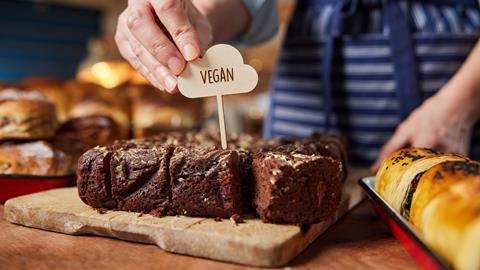

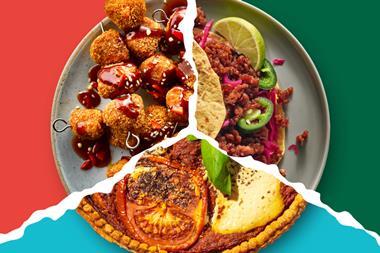

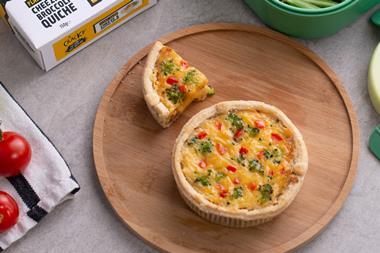
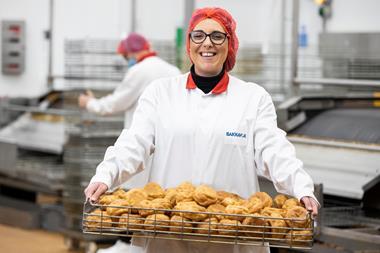



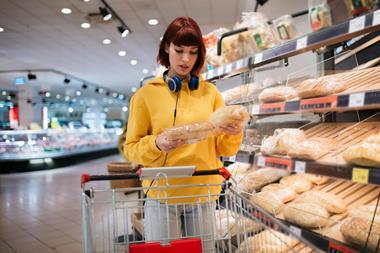




No comments yet